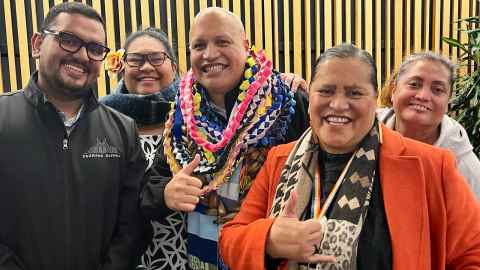First Science Tuākana programme launched
03 July 2025
Newly launched programme strengthens support for science students.

Outgoing Faculty of Science kaiarahi, Teariki Tuiono, has left a legacy for Māori and Pacific students with the newly launched Tuākana Science programme.
Passionate about advancing education and research opportunities for Māori and Pacific peoples, Teariki (Atiu/Cook Islands, Ngāpuhi) held the role of kaiarahi for three years. He steps away to complete his doctorate, confident that he leaves behind a strong pathway for Māori and Pacific students, building on the legacy of Emeritus Professor Michael Walker, who established the Tuākana programme in 1991.
Teariki co-designed the new 12-week course in collaboration with Te Tumu Herenga, Libraries and Learning Services. Its purpose is to equip tauira (students) with practical tools and cultural knowledge, helping them to successfully navigate life at Waipapa Taumata Rau, University of Auckland.
The Tuākana programme helps develop skills required to mentor younger peers starting out at university.
Tauira gathered at Ngā Tauira Marae on 26 May, giving presentations about their whakapapa and academic journeys. Teariki, who listened with pride, acknowledged the roopu: “You will forever be the first cohort to pioneer what will be a successful programme for future generations. These are beautiful reflections.”
Teariki is confident tomorrow’s leaders will emerge from the programme.
“I’ll be expecting some future prime ministers and officials, whether that’s in the Pacific or here in Aotearoa. We expect that with the wealth of knowledge you have learnt.
“It’s been beautiful knowing that these tauira are going to be future leaders, that they can stand and share their journey of how to navigate this space – which can be very alienating for Māori and Pacific.”
Sometimes for us Māori, you’ve got to see it and feel it – you’ve got to be able to touch it, that’s the difference.

The course was co-designed by Darlene Cameron (Te Aupōuri, Ngāti Kurī), kaitiaki and team leader for Māori and Pacific Learning and Teaching Development, and Veronika Iloilo (Lotofaga Aleipata and Lelumoega Tuai), programme lead for Leadership through Learning (LTL).
They held regular meetings with students, exploring tikanga Māori while learning of their personal and academic experiences navigating the University.
She says setting up the Science Tuākana programme was important in the lead-up to the Pūtaiao Science symposium scheduled for September in Northland.
Darlene says the programme is a great opportunity for Te Fale Pouāwhina and LTL (under the Learning and Research arm of Te Tumu Herenga, Libraries and Learning Services) to support the kaupapa (purpose) of the Faculty of Science Tuākana programme.
“The programme has allowed tauira to connect with Te Fale Pouāwhina, to stop by from time to time, to know that there is another whānau there with arms open, there to help them in whichever way is possible, and hopefully that will grow and continue over time.
“Sometimes for us Māori, you’ve got to see it and feel it – you’ve got to be able to touch it, that’s the difference.”
She says celebrating the programme was a proud and humbling occasion. Students shared experiences of learning to give a mihi, say a pepeha while connecting their studies to their own journeys, on the evening of celebration.
Many students expressed how the programme helped to strengthen their connection to their peers and also created a deeper sense of belonging. They were eager to pass on the learnings as mentors to students coming to the University.
“This has opened a huge opportunity for us, for a small whānau from Te Fale Pouāwhina with four kaimahi (staff) supporting the kaupapa of this mahi, it has been incredible," says Darlene.